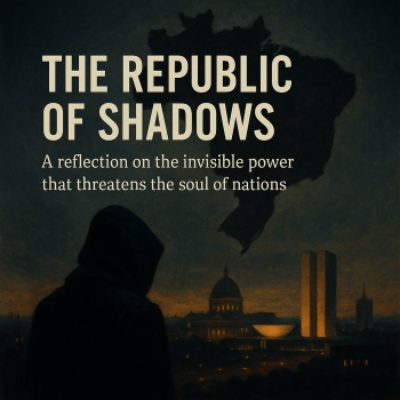Like, comment, share.
A reflection on the invisible power that threatens the soul of nations
“Everything that is hidden will be revealed.” (Luke 8:17)
Few forces have been as persistent and corrosive in recent history as the invisible power operating beyond the law. It is not merely a crime—it is a global economic machine that feeds on moral fragility, impunity, and political omission. It is profit without ethics, power without limits, and exploitation without remorse. No other human enterprise generates so much money with so little investment, without taxes, without control, and without borders. None produces such silent destruction.
Vulnerable nations have become fertile ground for this structure. The soil that shelters the seeds of an illicit economy is the same that harbors entire communities ruled by fear. These are territories abandoned to their fate, where the absence of the State allowed force to replace justice. Yet the evil is not confined to producing countries; it spreads through transit routes and major consumer centers, where demand fuels the cycle and hypocrisy masks the tragedy.
Mexico is the brutal portrait of this machinery—cities bowing before parallel powers. And Brazil, in its daily anguish, mirrors that same reality: at once pathway, hostage, and battlefield. From the Amazon borders to the coastal slums, from the favelas to the avenues, the geography of fear overlaps the geography of the homeland. At every corner, a domain; in every domain, a flag; behind each flag, a life cut short.
The deepest mutation, however, began when illegality crossed the wall of secrecy and put on the cloak of respectability. Money without a clear origin became company, contractor, foundation, media conglomerate, and political fund. It was then discovered that conquering hearts and minds is more profitable than controlling physical territories.
In Brazil, this infiltration no longer hides itself. The rhetoric that turns law enforcement officers into villains and transgressors into victims has inverted the meaning of justice and undermined the fight against illegality. A part of the activist media, disguised as compassion, turned narrative into a weapon. A legitimate operation becomes a “massacre,” a neutralized criminal turns into a “symbol,” and the besieged citizen is blamed for wanting safety. Meanwhile, the real power brokers—protected by offices and fortunes—watch impassively the chaos they helped finance.
The recent clashes within Brazil are not isolated events. They are chapters of a moral war between two Brazils: the real and the official. On one side, public servants risking their lives to reclaim what remains of sovereignty in lawless zones. On the other, a political and media machine that reduces human tragedy to statistics and slogans. The confrontation in the streets mirrors a deeper, spiritual conflict—the struggle between what is right and what is convenient. Society must choose between the right to life and complicity with error, between the rule of law and the rule of fear.
The illicit trade is the beating heart of corruption, violence, and misery that corrode the nation. It finances addiction and elections, speeches and diversions, propaganda and power. While young people die in alleyways for crumbs, the masters of this system negotiate contracts, influence decisions, and speak eloquently about “social justice.” The very substance that destroys families and dissolves conscience has become the most perverse symbol of an age in which lies are sold as compassion and vice disguises itself as virtue.
Fighting this system requires more than weapons—it demands moral, political, and intellectual courage. It means breaking the silent pact between those who call themselves progressives and those who profit from human degradation. Freedom, culture, and faith are being contaminated by the same substance that flows through the veins of the hidden economy. This contamination destroys both the body and the spirit of civilization. And when the State bows before the shadows, what dies is not only the law—it is the very idea of Nation itself.
Surely, Brazilian society is moving toward rediscovering the strength of moral repulsion and restoring the dignity and soul of its people.
Explanatory Notes for International Readers
- “Parallel power” – In Brazil, this refers to organized criminal networks that exert territorial and social control in communities abandoned by the State, often providing their own form of “justice” or “order.”
- “Activist media” – Describes sectors of the press accused of romanticizing or politically manipulating violence and criminality under the guise of social defense.
- “Two Brazils: the real and the official” – Expresses the growing divide between the daily experience of ordinary citizens and the narrative upheld by political elites and parts of the media.
Moral undertone – The article reflects a growing debate in Brazil about ethics, justice, and the erosion of civic values amid corruption, impunity, and ideological polarization
Two Flags Post – International Edition


